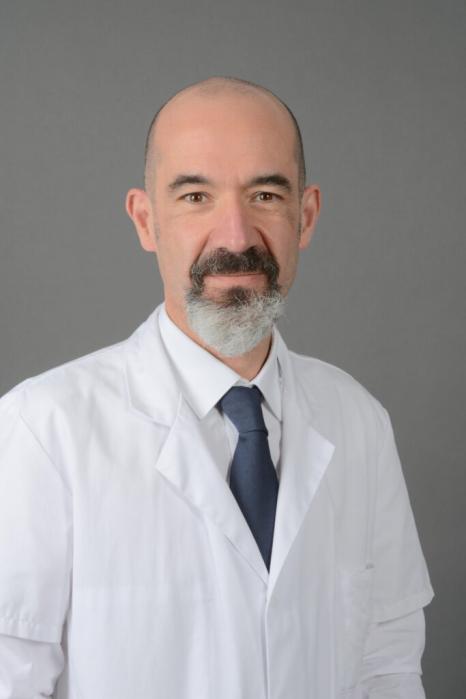
David Planchard: revolutionising targeted therapies for lung cancer
David Planchard is a thoracic oncologist at Gustave Roussy. He is also Associate Professor at Université Paris-Saclay and a member of the Genetic Adaptation to Kinase Inhibitors team withinthe Molecular Predictors and New Targets in Oncology unit (PMNCO - Univ. Paris-Saclay/French National Institute of Health and Medical Research, Inserm/Gustave Roussy). As both a researcher and a doctor, he dedicates his expertise to characterising the genetic anomalies in lung cancers in order to improve targeted therapies, achieving great success.
David Planchard's journey into medicine began at the Paris-Ouest Faculty of Medicine, driven by a deep-seated vocation. Oncology became the obvious choice for him. After completing an inter-CHU internship at Gustave Roussy and defending his medical thesis on pulmonary metastases of breast cancer, he moved to Poitiers University Hospital for two years of clinical training in pneumo-oncology. There, he quickly secured a position as a hospital practitioner and discovered early therapeutic trials for lung cancer."I realised that this was exactly what I wanted to do."»
David Planchard then turned to clinical research. In 2007, he obtained the European University Diploma in Translational and Clinical Research in Oncology from Université Paris Saclay. He requested a leave of absence from the Poitiers University Hospital to pursue his research, completing a thesis on DNA repair factors in lung tumour cells at Gustave Roussy.
Although he was expected to return to Poitiers to continue developing thoracic oncology within a new regional cancer centre, David Planchard decided to continue his career at Villejuif, drawn by Gustave Roussy's capacity to implement innovative therapeutic projects. Since then, his entire career has been at the Institute, where he has coordinated patient care as head ofthe thoracic pathology committeesince 2018, leading a multidisciplinary team. He is also President of theInternational Center for Thoracic Cancers (CICT),a health cooperation group combining Gustave Roussy and the Marie-Lannelongue and Paris Saint-Joseph Hospitals.
Characterising for better targeting
In the early 2000s, the first targeted therapy for lung cancer was developed following the discovery of the first targetable genetic anomaly: the epidermal growth factor receptor (EGFR) gene. The EGFR is responsible for 10% to 15% of non-small cell lung cancers, where a malignant tumour develops from the cells lining the walls of the bronchi, bronchioles and alveoli. The EGFR is found on the surface of tumour cells and functions by sending a growth signal to the cell nucleus.
« "Patients responded miraculously to this therapy," recalls David Planchard, who was the Principal Investigator (PI) of a clinical trial on the first human administration of third-generation anti-EGFR inhibitors, one of six parallel clinical trials conducted worldwide."To increase recurrence-free survival, we demonstrated, together with my North American colleagues, the clinical benefit of combining targeted therapy with chemotherapy, especially in patients with brain metastases, which are common in this type of cancer."Although this new combination was approved in the United States by the Food and Drug Administration (FDA), its approval in Europe has been delayed, "preventing French patients from accessing it," laments the researcher.
Hunting for BRAF
While many scientists continued to focus on the EGFR, David Planchard has become a specialist in another mutation, the V600E mutation of the BRAF gene, which codes for the BRAF protein kinase. This mutation is present in 2% to 3% of lung cancer patients (two-thirds of whom are former or current smokers)."The BRAFV600E mutation produces an abnormal BRAF protein, which leads to the irreversible development of tumour cells. It is like a switch stuck in the ON position, telling the cells to keep dividing, "explains the researcher.
David Planchard led an international multicentre clinical trial involving three successive cohorts of patients in 2011, 2013, and 2014, including those with the BRAFV600E anomaly. To anticipate the primary mechanism of resistance to anti-BRAF inhibitors, David Planchard successfully targeted this protein simultaneously with another protein downstream in the signalling pathway, MEK."Thanks to this dual blockade, we managed to inhibit BRAF more effectively in our patients using a combination of targeted therapies." ». This treatment became the global standard,entering the guidelines of medicines agencies worldwide by 2019 and propelling David Planchard to the highest international level in thoracic oncology.
Pinpointing circulating DNA in liquid biopsies
A leader in thoracic oncology, Gustave Roussy has been using liquid biopsies for the past five years, a less intrusive technique compared to tissue biopsies."From a blood sample, we can identify oncogenic mutations from circulating tumour DNA fragments in more than 60% of cases.. Our goal is to understand the mechanisms of resistance to targeted therapies, so that we can develop new generations of inhibitors and quickly adapt patient treatment." explains David Planchard.
TheSTING clinical trial has just begun for this purpose. It aims to test new patients at Gustave Roussy to define their molecular profile and tailor their treatment. In partnership with Françoise Farace's team, David Planchard is also working on identifying circulating tumour cells, particularly in BRAF patients. This involves isolating the tumour cells themselves through a filtering and sorting system for specific blood cells. "We can sequence the tumour DNA of each cell to capture its heterogeneity more accurately and the various complex cancer resistance mechanisms of each patient." »
Expanding research pathways for targeted therapies
« "The cancers of some of my patients are perfectly controlled with targeted therapy after five to ten years of treatment, although, unfortunately, most cancers will progress more rapidly,"says David Planchard. This is why he tirelessly pursues the development of new generations of targeted inhibitors or combinations, in collaboration with the pharmaceutical industry and theFrench Cooperative Thoracic Intergroup (Intergroupe francophone de cancérologie thoracique (IFCT)).He is also working on immunotherapy, which is mainly intended for heavy smokers whose cancer leads to multiple molecular alterations. "When we can't identify a targetable molecular alteration, we use immunotherapy. This involves unmasking tumour cells in patients: once these cells have been recognised by the immune system, patients can eliminate them naturally." Recently, David Planchard presented the results from ahighly promising multicentre clinical trialcoordinated by Gustave Roussy. It is a new class of drugs known as antibody-drug conjugates."The antibody targets a protein overexpressed on the surface of tumour cells. Conjugated to a chemotherapy drug via a linker system, it delivers the drug directly to the tumour cells, sparing the healthy cells." »
Since 2020, David Planchard has annually achieved the distinction of being a Highly Cited Scientist, placing him among the world's most frequently cited researchers. He serves as an example for future generations."Today, the bad news of a cancer diagnosis is immediately tempered by the hope of innovative therapies and personalised medicine", he concludes.

